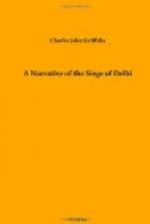The force sent to dislodge them was under command of Colonel Jones, of the 60th Rifles, who made his arrangements with singular judgment and tact, and insisted on a regular formation being kept by the troops, instead of the desultory style of action in vogue during previous sorties. There was, however, some very hard fighting in the gardens and serais, where we were received by a storm of bullets; but the men being persuaded to keep well under cover, the losses were not very serious, the casualties amounting in all to about ninety officers and men.[2] The enemy, as usual, suffered severely, more especially from the fire of our field-guns, which mowed them down when collected in groups of two and three hundred together.
[Illustration: FROM THE SMALL PICKET, SABZI MANDI, LOOKING TOWARDS KISHENGANJ.]
I was amused on this day, as well as on previous sorties, by seeing the eagerness with which the soldiers, European, Sikh, and Goorkha, rifled the bodies of the slain sepoys. These last had plundered the city inhabitants of all they could find in money and jewels, and having no place of safety (from the anarchy which prevailed in Delhi) in which to deposit their loot, they one and all invariably carried their treasure about with them, concealed in the kammerbund folds of muslin or linen rolled round the waist. On the fall of a mutineer, a rush would be made by the men to secure the coveted loot, a race taking place sometimes between a European and one of our native soldiers as to who should first reach the body. The kammerbund was quickly torn off and the money snatched up, a wrangle often ensuing among the men as to the division of the booty. In this manner many soldiers succeeded, to my knowledge, in securing large sums of money; one in particular, a Grenadier of my regiment, after killing a sepoy, rifled the body, and, returning in great glee to where I was standing, showed me twenty gold mohurs, worth L32 sterling. It was a most reprehensible practice, but almost impossible entirely to prevent, for in the loose order of fighting which generally prevailed, the men did not break from their ranks to accomplish their purpose, but often, in isolated groups of two and three, were separated at times a short distance from the rest of the combatants.
The General, we heard, was loud in his praise of the manner in which Colonel Jones conducted the operations on this day; after the action also, he withdrew his men in perfect order, allowing no straggling—a great contrast to our former usual style when returning to camp after the repulse of a sortie.
This was the last action of any consequence fought in the open at the Sabzi Mandi Gardens. The ground in front of the picket was soon after cleared, and during future attacks our men remained behind the breastworks and entrenchments which had been thrown up, and by a steady fire soon drove back any rebels who were foolhardy enough to come within range.




